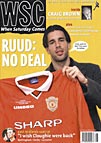 Having won the Premiership for the sixth time in eight seasons, are Manchester United in a (European) league of their own?
Having won the Premiership for the sixth time in eight seasons, are Manchester United in a (European) league of their own?
So, another stroll to the title for Manchester United with records broken in the process for the number of goals scored and the points margin ahead of second place. Is it all getting a bit too easy? The Sunday Times thinks so, suggesting they “are on the threshold of the sort of monopoly Rangers enjoy in Scotland”. The relative ease with which United won their sixth title in eight years has been contrasted with more closely contested championships elsewhere, with Lazio still pushing Juventus in Italy, Bayer Leverkusen leading Bayern Munich going into the final fortnight of the Bundesliga and as many as four teams with a realistic chance of winning the Spanish league with three games left.
Of course, if Chelsea and Man Utd had gone on to the Champions League final, and Leeds and Arsenal had contested UEFA Cup final, the same pundits would have cited this as evidence that the Premier League really is the best in Europe. Instead, it seems, the top English clubs are being held back by the paucity of their domestic opposition who are incapable of providing the sort of challenges that will be encountered on trips to Rome and the Nou Camp.
Of course it’s ridiculous to jump to conclusions about the relative strength of leagues based on the results of a single season. Despite Italian clubs having their worst year for over a decade, with no clubs in the last four of either tournament, it would be hard to disagree too strongly with Didier Deschamps’s recent claim that if Serie A clubs played the equivalently placed teams in the Premier League they would win virtually every game.
He might have added that although the money in the Premiership is good, the kind of high-profile foreign players English clubs attract at the moment still tend to be the wrong side of 30 and to have varying levels of pace and commitment left in the tank. Eh Didier?
Clearly the standard of the Premiership below the top five is not good. West Ham may be about to break a club record with three consecutive finishes in the top half of the league, but they looked like a team from at least a division below Man Utd in their recent 7-1 defeat at Old Trafford. At times this season Middlesbrough have looked as bad as any of the relegation candidates (well, maybe not Watford) yet they could still finish in the top half.
But the good news is that the current hierarchy is not necessarily set in stone. Man Utd and Arsenal owe their predominant positions in English football not just to their constantly expanding wealth, but also to having particularly good managers. When they have departed – Ferguson in a couple of years, Wenger possibly earlier still, it is likely that both clubs will endure a period of upheaval. As Man Utd have found through their failure to replace Peter Schmeichel adequately, outstanding talent can leave a vacuum in its wake.
Elsewhere in Europe, clubs that looked like monsters a few years ago are suffering. Borussia Dortmund and Olympique Marseille – both European Cup winners in the Nineties – have diced with relegation this season, while in Spain the 1996 double winners Atlético Madrid and the former holders of the world record transfer fee, Real Betis, are both on the verge of going down to the second division at the time of going to press.
Those gratifying examples serve as a thorougly healthy reminder that money and reputation are not enough. Of course those with such reputations do not see it quite like that. They can be expected to try to perpetuate their domestic dominance by pulling further away from the pack before they have a chance to catch up. Last month it was announced that the Spanish TV company Telefonica has approached other European networks with an idea for a European league to begin next year with 16 teams, including Man Utd, Arsenal and Liverpool, playing 30 games a season supposedly alongside domestic fixtures. As ever, all involved swear solemnly that they have no intention of quitting their national leagues.
They can’t have it both ways. Either domestic championships stay competitive and everyone runs the risk, however small, of doing a Dortmund. Or the big clubs secure their status indefinitely and the title race becomes as dull as England’s. Good job there are three other divisions, for the time being.
From WSC 160 June 2000. What was happening this month